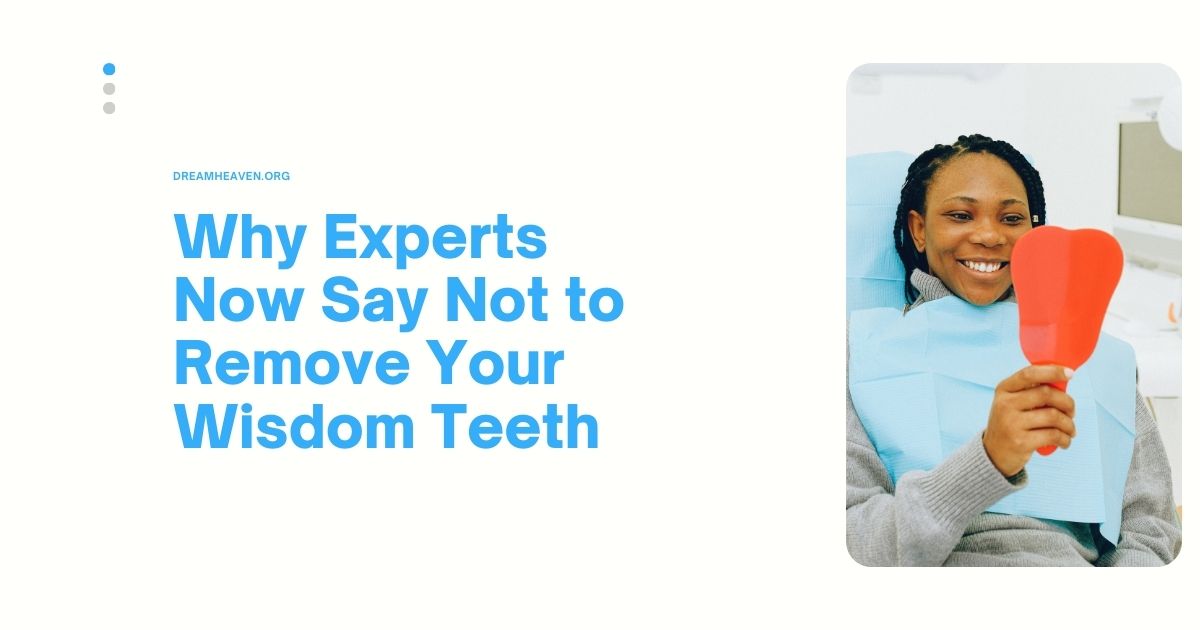Why Experts Now Say Not to Remove Your Wisdom Teeth Wisdom teeth removal has long been a common dental procedure. However, experts are now questioning whether this surgery is always necessary. New research and evolving medical opinions suggest that leaving healthy, asymptomatic wisdom teeth intact may be a better choice for many individuals. Let’s explore the reasons behind this shift in perspective.
Wisdom Teeth May Not Always Cause Problems
For years, dentists removed wisdom teeth preemptively, fearing complications like impaction or overcrowding. However, studies reveal that not all wisdom teeth cause issues. If they grow in properly and remain healthy, removal may be unnecessary.
Surgery Comes with Risks
Removing wisdom teeth is a surgical procedure, and like any surgery, it carries risks such as infection, bleeding, nerve damage, or complications from anesthesia. Experts now argue that avoiding these risks is preferable when the teeth aren’t causing harm.
Natural Functionality of Wisdom Teeth
Wisdom teeth serve a purpose, acting as extra molars for chewing in some individuals. For those who lose teeth earlier in life, keeping wisdom teeth can help maintain chewing ability and oral function later on.
Advances in Dental Monitoring
With modern dental imaging and regular checkups, dentists can now closely monitor wisdom teeth over time. This allows potential problems to be addressed early without immediate removal.
Avoiding Unnecessary Costs
Wisdom teeth removal can be expensive, especially if it’s not covered by insurance. Choosing to monitor rather than remove healthy teeth can save patients money without compromising their oral health.
Post-Surgical Recovery Challenges
Recovery from wisdom teeth removal can be uncomfortable and lengthy, involving pain, swelling, and dietary restrictions. Experts suggest sparing patients this experience when the surgery isn’t clearly necessary.
Not All Impactions Require Surgery
Even partially impacted wisdom teeth don’t always need to be removed. Some can coexist with other teeth without causing pain, infection, or damage. Dentists now prefer a case-by-case approach rather than automatic extraction.
Avoiding Long-Term Nerve Damage
Wisdom teeth are often close to important facial nerves. Removal can sometimes lead to temporary or permanent nerve damage, affecting sensation in the jaw, lips, or tongue. Avoiding surgery reduces this risk.
Changing Perspectives in Preventive Dentistry
The philosophy of preventive dentistry has shifted. Instead of removing teeth as a precaution, the focus is now on preserving natural structures and intervening only when necessary.
Healthier Lifestyle Choices Reduce Risks
With better oral hygiene practices and access to dental care, many of the complications that historically warranted wisdom teeth removal are less common today.
Conclusion
The decision to remove wisdom teeth should no longer be automatic. Instead, dentists and patients are encouraged to take a personalized approach based on individual health, symptoms, and potential risks. By retaining healthy, asymptomatic wisdom teeth, many people can avoid unnecessary surgery and enjoy the benefits of a more natural approach to dental care.
FAQs
1. When is it necessary to remove wisdom teeth?
Why Experts Now Say Not to Remove Your Wisdom Teeth if they are causing pain, infection, cysts, or damage to nearby teeth or if they’re at high risk of future complications.
2. Can wisdom teeth grow without causing issues?
Yes, many people have wisdom teeth that erupt fully and function well without causing any problems.
3. What are the risks of keeping wisdom teeth?
The main risks include potential crowding, gum disease, or infection if the teeth are difficult to clean or partially erupted.
4. How can I tell if my wisdom teeth need to be removed?
Regular dental checkups and X-rays can help determine if your wisdom teeth are causing or are likely to cause issues in the future.
5. Are there benefits to keeping wisdom teeth?
Yes, they can serve as functional molars if they’re healthy and properly aligned, potentially aiding in chewing and maintaining oral structure.

